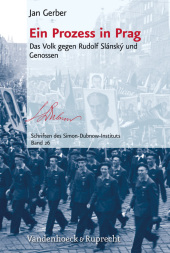 Neuerscheinungen 2017Stand: 2020-02-01 |
Schnellsuche
ISBN/Stichwort/Autor
|
Herderstraße 10
10625 Berlin
Tel.: 030 315 714 16
Fax 030 315 714 14
info@buchspektrum.de |

Jan Gerber
Ein Prozess in Prag
Das Volk gegen Rudolf Slánskě und Genossen. Habilitationsschrift
2. Aufl. 2017. 296 S. 23.2 cm
Verlag/Jahr: VANDENHOECK & RUPRECHT 2017
ISBN: 3-525-37055-5 (3525370555)
Neue ISBN: 978-3-525-37055-1 (9783525370551)
Preis und Lieferzeit: Bitte klicken
Die Studie wirft einen neuen Blick auf das Slánskě-Tribunal 1952 und den Spätstalinismus.
In November 1952, Rudolf Slánskě and thirteen other Czechoslovak high-ranking officials of the Communist party and the government were accused of conspiracy against the People´s Republic in the most notorious and last ever Stalinist show trial, taking place in Prague. Eleven of them were executed, three sentenced to life imprisonment. The Slánskě Trial differed from other Stalinist show trials in the number of death penalties handed down and its openly anti-Semitic tendencies. Eleven of the accused were of Jewish origin. Resorting to the biographies of two writers who grew up in Bohemia, Louis Fürnberg, author of the song "The Party is Always Right," and F. C. Weiskopf, Jan Gerber explores why, only seven years after the liberation of Auschwitz, anti-fascists carried out a trial in which Jews were indicted for being Jews. He examines further why, of all places, this trial took place in communist Czechoslovakia, a country that had been considered an island of democracy and tolerance during the interwar period. The biographies of Fürnberg and Weiskopf, who in the early 1950s were impacted by the general political atmosphere created by the Slánskě Trial, and, fearing persecution, ultimately left Czechoslovakia for the GDR, show that the Slánskě Trial did not solely derive from the initiative of Moscow. At the same time, the conflicts over nationality of the interwar period continued in the trial ideologically encoded.
Gerber, Jan
PD Dr. Jan Gerber ist leitender Wissenschaftlicher Mitarbeiter am Simon-Dubnow-Institut für jüdische Geschichte und Kultur an der Universität Leipzig.


